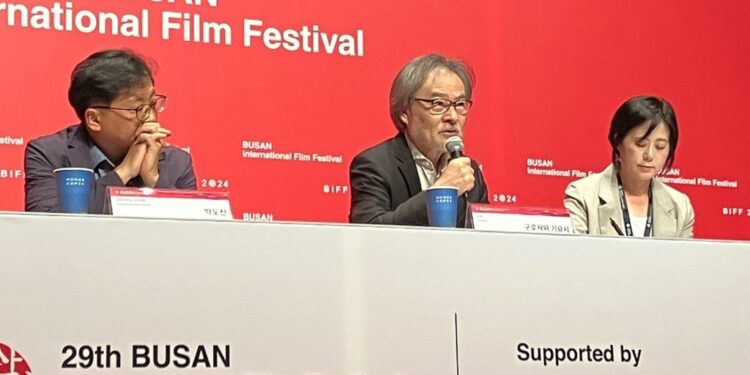Japanese filmmaker Kiyoshi Kurosawa, this year’s Asian Filmmaker of the Year at Busan International Film Festival, talked about the two films he has playing here, as well as the recent wave of young talent emerging in Japan, during a press event on the second day of the festival.
Mentioning that he turns 69 years old this year, Kurosawa said he decided to churn out two films in a short space of time – Cloud, starring Masaki Suda as a factory worker with a dubious online side hustle, and Serpent’s Path 2024, a French-language remake of his 1998 Japanese film of the same name. Both films are screening as Galas in Busan after Cloud premiered at Venice film festival and Serpent’s Path in San Sebastian.
“It wasn’t my intention, but when I received an invitation from a French producer to remake one of my films in France, I chose Serpent’s Path without hesitation,” Kurosawa explained.
“The original was written by Hiroshi Takahashi, and it was very well-written and unique. When I made the film, I felt it had a lot of influence from the scriptwriter and in some ways didn’t feel like my film. So, my desire was to remake it with my own style.”
In the Japanese version, Serpent’s Path tells the story of a man who enlists a friend to help him identify and exact revenge upon his daughter’s murderer. Kurosawa said that he enjoyed taking the story out of its original yakuza (Japanese gangster) setting and giving it a fresh spin in the French version in which the bad guys are part of a cult.
“I didn’t want to repeat the typical ‘yakuza’ character, with the style of their costumes and the way they talk,” Kurosawa said. Mathieu Amalric, Aoki Munetaka and Damien Bonnard head the cast of the French version.
As for Cloud, he said he wanted to make a realistic genre film, but it was difficult to get financing for the project during the pandemic. He only managed to get the film made after casting Suda, who is known for films including Wilderness: Part One and We Made A Beautiful Bouquet.
“Many Japanese genre films don’t reflect reality – they have stereotypical serial killers or yakuza as protagonists – but I wanted to create a character who was somebody you could meet in real life,” Kurosawa explained. “I needed a young actor who can play timid and ordinary, but also a bit dirty. Masaki Suda was perfect for the role.”
Kurosawa’s past credits also include Tokyo Sonata (2008), which won the Un Certain Regard Jury Prize in Cannes; Journey To The Shore (2014), which won Un Certain Regard Best Director; and Wife Of A Spy (2020), which won the Silver Lion for Best Director at Venice film festival. For several years, he was one of a quartet of Japanese filmmakers known as the “Four Ks” (also including Hirokazu Kore-eda, Takeshi Kitano and Naomi Kawase) who dominated the international festival circuit.
In recent years, however, a new wave of Japanese talent has started appearing at international film festivals. Kurosawa said he admires the work of Ryusuke Hamaguchi and Koji Fukada, although he’s not sure they still qualify as young.
“Many talented young directors are appearing now – one reason is that the digitalization of filmmaking has made it easier for young filmmakers to achieve a certain quality,” Kurosawa observed. “I started out making films in 8mm and the dialogue had to be simple because it was difficult to catch the right sound.”
But he also observed that Japan lacks a new wave of genre filmmakers: “Japan has a lot of great young directors, but they’re not making genre movies, while Korea has a lot of genre filmmakers, and I really envy them. Filmmakers like Hamaguchi and Fukada are making a lot of good films, but it would be interesting to see what would happen if they tried genre.”
Kurosawa received Busan’s Asian Filmmaker Of The Year award at the festival’s opening ceremony last night. The festival is running until October 10, with the Asian Contents and Film Market taking place October 5-8.






